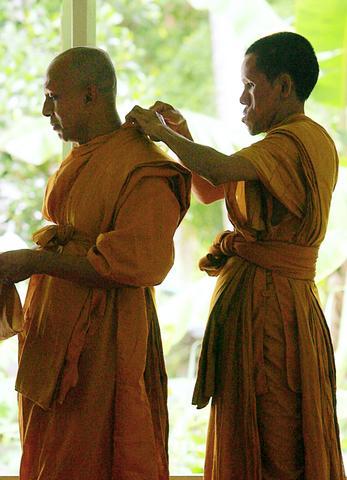Thailand turned soldiers into monks on Thursday for dispatch to remote temples in the largely Muslim south in hopes of restoring confidence among Buddhists in the violence-torn area.
Most of the soldiers, police officers and civil servants among the 222 monks ordained at temples in three Malay-speaking provinces would serve for the three-month Buddhist Lent period starting on August 1, officials said.
The majority of them, heads shaven and clad in the saffron robes of a monk, were low-ranking soldiers whose mission was to boost Buddhists' sense of security during the period when the devout study holy scriptures, they said.

PHOTO: REUTERS
"People have been scared to become monks these days, so we are now recruiting monks from [among] soldiers," Lieutenant General Pisan Wattanawongkeeree told reporters after one ordination ceremony.
Pisan said he was not worried about the troops' safety, despite three monks being among the 300 people killed since January, when violence erupted in a region where a low-key separatist war was fought in the 1970s and 1980s.
The government says it cannot pinpoint the precise roots of or motives behind the violence, citing a complex mix of history, corruption, crime, drugs, religion and separatism.
Many of those killed were shot or hacked to death by motorcycle pillion riders, including the three monks who were killed with machetes while on their morning rounds to collect food from lay Buddhists.
"These new monks need no extra training because they are innocent people whose job is to nurture Buddhism," Pisan said.
Thailand's Buddhist Lent falls during the rainy season, when monks are not allowed to take long journeys. Thai men often use the season as a period of retreat to study their religion.
About a fifth of the 200 temples in the far south have been unstaffed for years, and many more were abandoned after the monks were killed in January, officials said.
That left southern Buddhists, who are about 20 percent of the population in the three southern provinces that have borne the brunt of the violence, without the monks who are a common sight in the rest of Thailand, which overall is 90 percent Buddhist.
After the three monks were murdered, other monks either suspended alms collections or were escorted by soldiers.
The violence erupted without warning on January 4, when gunmen stormed an army camp and killed four soldiers before making off with about 400 assault rifles.
Almost daily attacks since then have targeted police, officials, schools and teachers. Much of the area is under martial law, with 10,000 police and soldiers manning roadblocks and security posts.
The latest casualty came on Thursday, when a policeman was shot dead while directing traffic near a bustling market in Pattani province, police said.
A Cabinet minister newly appointed to supervise military operations in the south said on Wednesday that security forces would begin to use guerrilla warfare to stop the daily killings.

Kehinde Sanni spends his days smoothing out dents and repainting scratched bumpers in a modest autobody shop in Lagos. He has never left Nigeria, yet he speaks glowingly of Burkina Faso military leader Ibrahim Traore. “Nigeria needs someone like Ibrahim Traore of Burkina Faso. He is doing well for his country,” Sanni said. His admiration is shaped by a steady stream of viral videos, memes and social media posts — many misleading or outright false — portraying Traore as a fearless reformer who defied Western powers and reclaimed his country’s dignity. The Burkinabe strongman swept into power following a coup in September 2022

‘FRAGMENTING’: British politics have for a long time been dominated by the Labor Party and the Tories, but polls suggest that Reform now poses a significant challenge Hard-right upstarts Reform UK snatched a parliamentary seat from British Prime Minister Keir Starmer’s Labor Party yesterday in local elections that dealt a blow to the UK’s two establishment parties. Reform, led by anti-immigrant firebrand Nigel Farage, won the by-election in Runcorn and Helsby in northwest England by just six votes, as it picked up gains in other localities, including one mayoralty. The group’s strong showing continues momentum it built up at last year’s general election and appears to confirm a trend that the UK is entering an era of multi-party politics. “For the movement, for the party it’s a very, very big

ENTERTAINMENT: Rio officials have a history of organizing massive concerts on Copacabana Beach, with Madonna’s show drawing about 1.6 million fans last year Lady Gaga on Saturday night gave a free concert in front of 2 million fans who poured onto Copacabana Beach in Rio de Janeiro for the biggest show of her career. “Tonight, we’re making history... Thank you for making history with me,” Lady Gaga told a screaming crowd. The Mother Monster, as she is known, started the show at about 10:10pm local time with her 2011 song Bloody Mary. Cries of joy rose from the tightly packed fans who sang and danced shoulder-to-shoulder on the vast stretch of sand. Concert organizers said 2.1 million people attended the show. Lady Gaga

SUPPORT: The Australian prime minister promised to back Kyiv against Russia’s invasion, saying: ‘That’s my government’s position. It was yesterday. It still is’ Left-leaning Australian Prime Minister Anthony Albanese yesterday basked in his landslide election win, promising a “disciplined, orderly” government to confront cost-of-living pain and tariff turmoil. People clapped as the 62-year-old and his fiancee, Jodie Haydon, who visited his old inner Sydney haunt, Cafe Italia, surrounded by a crowd of jostling photographers and journalists. Albanese’s Labor Party is on course to win at least 83 seats in the 150-member parliament, partial results showed. Opposition leader Peter Dutton’s conservative Liberal-National coalition had just 38 seats, and other parties 12. Another 17 seats were still in doubt. “We will be a disciplined, orderly